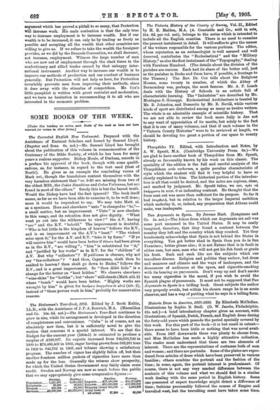The Corrected English. New Testament. Prepared with the Assistance of
Eminent Scholars and Issued by Samuel Lloyd. (Bagster and Sons. 6s. net.)—Mr. Samuel Lloyd has brought about the publication of this volume in commemoration of the Centenary of the Bible Society, of which he has been for many years a zealous supporter. Bishop Moule, of Durham, records in a preface his approval of the book, though with some qualifi- cations, as, for instance, in regard to the text used (that of Nestle). He gives as an example the concluding verses of Mark xvi., though the translators content themselves with the very harmless statement that "vv. 9-20 are missing from two of the oldest MSS., the Coder Sinaiticus and Coder Vaticanus, but are found in most of tho others." Surely this is but the barest truth. Would tho Bishop have had the fact ignored ? Tho book itself seems, as far as we have been able to examine it, to be well done ; more it would be imprudent to say. We may take Matt. xi. as a specimen. Here and elsewhere " unto " is changed to " to,"— a small matter, but an improvement. " Unto " is now obsolete in this usage, and its retention does not give dignity. " What went ye out into the wilderness to view ? " the A.V. having "see" and the R.V. "behold." The improvement is doubtful. "Who is but little in tho kingdom of heaven" follows the R.V., and is an improvement on the A.V.'s "least" " Tho violent seize upon it," for the A.V. and R.V. "take it by force." "If ye will receive him" would have been better if eaere had been given as in the R.V., "are willing "; " him " is substituted for "it," and "justified by her works" as in R.V. for the " children " of A.V. But why " collectors" ? If publicans is obscure, why not say "tax-collectors" ? "And thou, Capernaum, shalt thou be exalted to heaven ? thou shalt go down to Hades," follows the RV., and is a great improvement. So "thou didst hide" is a change for the better on " hast hidden." We observe elsewhere " wine-skins " for "bottles " ; but " shore " still stands (Matt. xiii. 2) where " beach" would have been better. " Mighty works are
wrought by him" is given for Sesaaets &snakily ?), (xiv. 2), instead of "these powers work in him," probably for conservative reasons.










































 Previous page
Previous page